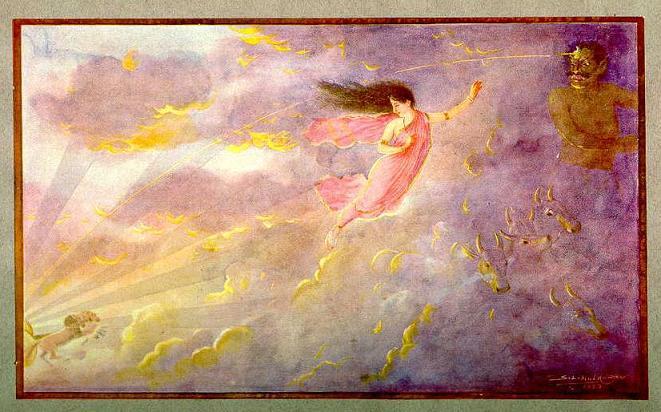srigurubhyO namahA |
Through words that carry multiple layers of meaning, some of which are concealed wisely from those unfit for understanding such subtle truths, the 158th mantrA presents the sage's observation that once the life principle has left this body, there is no further merit or use to this body. The allegory of the potter with his wet clay is used here to reveal a different truth.
Through words that carry multiple layers of meaning, some of which are concealed wisely from those unfit for understanding such subtle truths, the 158th mantrA presents the sage's observation that once the life principle has left this body, there is no further merit or use to this body. The allegory of the potter with his wet clay is used here to reveal a different truth.
வளத்திடை முற்றத்தோர் மாநிலம் முற்றுங்
குளத்தின் மண்கொண்டு குயவன் வனைந்தான்
குடமுடைந் தால் அவை ஓடென்று வைப்பர்
உடலுடைந் தால்இறைப் போதும் வையாரே. I.2.16.158
குளத்தின் மண்கொண்டு குயவன் வனைந்தான்
குடமுடைந் தால் அவை ஓடென்று வைப்பர்
உடலுடைந் தால்இறைப் போதும் வையாரே. I.2.16.158
This
universe entire of treasures vast compact,
The Great Potter from watery clay wrought to shape;
If the moulded pot breaks, men keep the pieces still,
But if the vital body cracks, who even a while cares it to keep?I.2.16.158
The Great Potter from watery clay wrought to shape;
If the moulded pot breaks, men keep the pieces still,
But if the vital body cracks, who even a while cares it to keep?I.2.16.158
Com
- This universe entire of treasures vast
compact, the entire universe (then unmanifest) came into being and
presented itself as the incomparable blank space (to serve as the very basis of
creation). The Great Potter from watery
clay wrought to shape; the creator Brahma
fashioned a ‘pot’ (body) out of the ‘clay’ (shrOnithA/ovum)
that lay within the watery pool of the womb, like the potter makes a pot out of
clay. If the moulded pot breaks, men
keep the pieces still, when the pot that is made of fired clay breaks or
cracks people would retain those pieces that would serve some purpose (as roof
tile fixes) for future use But if the
vital body cracks, who even a while cares it to keep? But when this body
(comparable to a vessel/pot) breaks (i.e. death), would anyone keep the corpse
in the house for a moment longer than is absolutely necessary to prepare for
the cremation? No. Nobody would.
*The
first two lines of this verse have a hidden layer of meaning. While comparing
the creator Brahma to the potter who
fashions pots from wet clay, the sage also alludes to the ‘seed’ of the
creative impulse. In the macrocosmic level, the element of pure space or AkAshA serves as the medium through
which a more physical universe (s) can be made manifest. This is indicated by
the words where entire universes in potency are present in the ‘apparent’ blank
space of ether. Using this as the raw material, the creator begins fashioning
the complex and ever expanding manifest universe. This creation encompasses all
beings, and is also inclusive of the inanimate or jada prakruti. Within this scale, there is on the one hand the
physical earth or clay which is fashioned into a pot. And on the other, is the
fascinating and most marvellous creation of the physical body.
This
physical body is fashioned out of the ‘wet clay’ of the shrOnithA which is both the ovum and the ‘reproductive energy’
simultaneously. It is referred to as being wet to indicate the connection to
the watery womb which serves as the basis for the creation of this body. In the
last two lines of the verse, we are made aware of the transience of all form
and the overall uselessness of this physical body once it has been vacated by
the indwelling soul. He observes that while even broken pieces of the clay pot
might serve a further purpose someday as roof tiles and thus be retained by
people for a future date, the human body can take no such credit. Though it has
been fashioned by great creator, once the life force has departed from the body
there is no more value attached to it and thus is consigned to the flames.
thirucchitrambalam |
